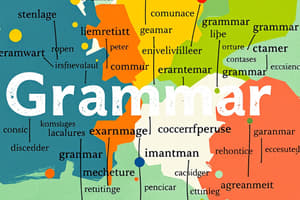Podcast
Questions and Answers
What are phonemes in the English language?
What are phonemes in the English language?
- Parts of speech
- Distinct units of sound (correct)
- Words with multiple meanings
- Rules for sentence structure
What type of word is 'quickly' in the sentence 'He runs quickly'?
What type of word is 'quickly' in the sentence 'He runs quickly'?
- Noun
- Adverb (correct)
- Adjective
- Verb
Which of the following is an example of a compound sentence?
Which of the following is an example of a compound sentence?
- She dances because she loves it.
- I run every morning.
- They left early.
- He plays football, and she plays tennis. (correct)
Which of these is NOT a part of speech?
Which of these is NOT a part of speech?
What does the term 'cognate' refer to in vocabulary?
What does the term 'cognate' refer to in vocabulary?
Which punctuation mark is primarily used to indicate a question?
Which punctuation mark is primarily used to indicate a question?
What is the primary difference between creoles and pidgins?
What is the primary difference between creoles and pidgins?
What is one characteristic of Modern English literature?
What is one characteristic of Modern English literature?
Study Notes
Overview of English Language
- Definition: English is a West Germanic language originating in medieval England.
- Global Influence: Widely spoken as a first or second language around the world; a major global lingua franca.
Phonetics and Phonology
- Phonemes: English has about 44 phonemes (consonants and vowels).
- Stress and Intonation: Stress can change meaning; intonation conveys emotion and questions.
Grammar
-
Parts of Speech:
- Nouns: Names of people, places, things (e.g., cat, London).
- Verbs: Action or state words (e.g., run, is).
- Adjectives: Describe nouns (e.g., blue, tall).
- Adverbs: Modify verbs, adjectives (e.g., quickly, very).
- Pronouns: Replace nouns (e.g., he, they).
- Prepositions: Show relationships between nouns (e.g., in, on).
- Conjunctions: Connect words or clauses (e.g., and, but).
-
Sentence Structure:
- Simple: One independent clause (e.g., She runs).
- Compound: Two independent clauses (e.g., She runs, and he swims).
- Complex: One independent clause and at least one dependent clause (e.g., She runs because she enjoys it).
Vocabulary
-
Types:
- Cognates: Words with a common etymological origin (e.g., mother in English and madre in Spanish).
- Loanwords: Words borrowed from other languages (e.g., cafe from French).
-
Word Formation:
- Compounding: Combining two or more words (e.g., toothpaste).
- Affixation: Adding prefixes and suffixes (e.g., unhappy, quickly).
Writing System
- Alphabet: 26 letters (A-Z) in the Latin script.
- Punctuation: Key elements include periods, commas, question marks, and quotation marks.
Dialects and Varieties
- Accents and Dialects: Variations in pronunciation and vocabulary (e.g., British vs. American English).
- Creoles and Pidgins: English-based languages that developed in multilingual contexts (e.g., Jamaican Patois).
Literature and Culture
-
Literary Periods:
- Old English: Ca. 450-1150 AD (e.g., Beowulf).
- Middle English: Ca. 1150-1500 AD (e.g., Chaucer's The Canterbury Tales).
- Modern English: Post-1500 AD, includes Shakespeare and contemporary literature.
-
Styles and Genres: Includes poetry, prose, drama, and non-fiction.
Language Learning
-
ESL/EFL: English as a Second Language / English as a Foreign Language; methods and approaches vary (e.g., communicative approach, grammar-translation).
-
Challenges: Pronunciation, irregular verbs, phrasal verbs, and idiomatic expressions can be difficult for learners.
Overview of English Language
- English is a West Germanic language that emerged in medieval England.
- It serves as a global lingua franca, widely used as a first or second language worldwide.
Phonetics and Phonology
- Approximately 44 phonemes exist in English, encompassing both consonants and vowels.
- Stress placement can alter meaning, while intonation is crucial for expressing emotions and indicating questions.
Grammar
- Parts of Speech:
- Nouns identify people, places, or objects (e.g., "cat," "London").
- Verbs signify actions or states (e.g., "run," "is").
- Adjectives enhance nouns (e.g., "blue," "tall").
- Adverbs modify verbs or adjectives (e.g., "quickly," "very").
- Pronouns stand in for nouns (e.g., "he," "they").
- Prepositions illustrate relationships between nouns (e.g., "in," "on").
- Conjunctions connect words or clauses (e.g., "and," "but").
- Sentence Structure:
- Simple sentences consist of one independent clause (e.g., "She runs").
- Compound sentences contain two independent clauses (e.g., "She runs, and he swims").
- Complex sentences include one independent clause and at least one dependent clause (e.g., "She runs because she enjoys it").
Vocabulary
- Types:
- Cognates are words that share an etymological origin across languages (e.g., "mother" in English and "madre" in Spanish).
- Loanwords are borrowed from other languages (e.g., "cafe" from French).
- Word Formation:
- Compounding involves merging two or more words (e.g., "toothpaste").
- Affixation adds prefixes and suffixes (e.g., "unhappy," "quickly").
Writing System
- The English alphabet consists of 26 letters (A-Z) from the Latin script.
- Punctuation is vital for clarity, with key marks including periods, commas, question marks, and quotation marks.
Dialects and Varieties
- Accents and dialects showcase regional variations in pronunciation and vocabulary, such as British English versus American English.
- English-based creoles and pidgins, like Jamaican Patois, arose in multilingual contexts.
Literature and Culture
- Literary Periods:
- Old English (circa 450-1150 AD) featured works like "Beowulf."
- Middle English (circa 1150-1500 AD) includes notable texts such as Chaucer's "The Canterbury Tales."
- Modern English emerged post-1500 AD, showcasing authors like Shakespeare and contemporary writers.
- The literature encompasses diverse styles and genres including poetry, prose, drama, and non-fiction.
Language Learning
- ESL (English as a Second Language) and EFL (English as a Foreign Language) utilize varied teaching methods, including the communicative approach and grammar-translation.
- Learners may encounter challenges such as pronunciation difficulties, irregular verbs, phrasal verbs, and idiomatic expressions.
Studying That Suits You
Use AI to generate personalized quizzes and flashcards to suit your learning preferences.
Description
This quiz covers essential topics regarding the English language, including its definition, phonetics, phonology, and grammar. Learn about the various parts of speech, sentence structure, and the global influence of English as a major lingua franca. Test your knowledge on these foundational aspects of English language studies.




